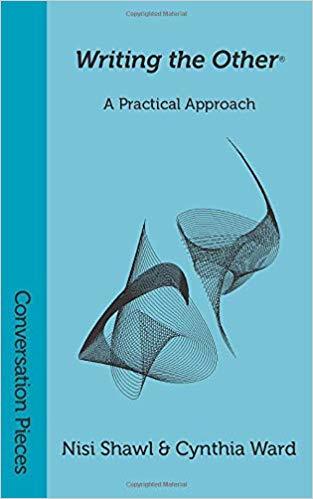POSSIBLY [not] IRRITATING ESSAY: An “Other” Point of View When Writing Speculative Fiction, Young Adult, and Middle Grade Fictions
 Using the Program Guide of the World Science Fiction Convention in Dublin, Ireland in August 2019 (I am (finally!) going to DisCon III in Washington, DC, Aug 20-25, 2021!!!!), I will jump off, jump on, rail against, and shamelessly agree with the BRIEF DESCRIPTION given in the pdf copy of the Program Guide. The link is provided below where this appeared at 2 pm on August 16, 2019…
Using the Program Guide of the World Science Fiction Convention in Dublin, Ireland in August 2019 (I am (finally!) going to DisCon III in Washington, DC, Aug 20-25, 2021!!!!), I will jump off, jump on, rail against, and shamelessly agree with the BRIEF DESCRIPTION given in the pdf copy of the Program Guide. The link is provided below where this appeared at 2 pm on August 16, 2019…Cultural appropriation: a product of a shrinking world?
White SFF authors have historically appropriated other cultures to add depth and excitement to their characters: The Wheel of Time takes the culture of POC and gives it to the Aiel, and Frank Herbert appropriates Islam and applies it to the Fremen. With relatively easy access to travel and digital information these days, how can we make use of a range of influences while avoiding cultural appropriation?
Dr Wanda Kurtcu: Moderator, wrote Star Trek: The Next Generation episode 'A Matter of Honor', recently retired Curriculum and Technology Integration Specialist in the San Francisco Bay areaMichi Trota: Editor at SFWA, four-time Hugo Award winner, British Fantasy Award winner, and the first Filipina to win a Hugo AwardFulvio Gatti: Italian journalistPRK: Australian reviewer, Aurealis Award judgeJeannette Ng: From Hong Kong and UK writer of gothic fantasy with a theological twist
This subject has implications to both my speculative fiction stories and my YA/MG stories.
It may be that a YA novel I wrote with a biracial teen boy as the viewpoint character was unsellable because I’m a big, old, fat, white guy (a bofwhig). No proof, just that my name most likely belongs to someone like me rather than hinting at or actually being a name from another culture. I’ve heard that the YA market currently is very militant in protecting the rights of cultures often pirated by white men and women or people outside of a community they’ve written about. (https://www.theguardian.com/books/2019/jun/15/torn-apart-the-vicious-war-over-young-adult-books) I actually considered asking one of my beta readers, Abbas Noor, if I could put his name as my “nom-de-plume”. He could go to any award banquets or accept awards in my name – for a cut of the profits! (jk)
I agree that cultural appropriation has been rampant for centuries and that it’s imperative to examine all of our writing for cultural bias.
However…there are issues in the room that are somehow “overlooked” by the same field when an author has a large following. Two examples that come to mind immediately I will frame as questions.
In children’s literature, the novel THEN AGAIN MAYBE I WON’T, famed author Judy Blume’s main character is a pre-adolescent boy who (among other things) falls into being a window-peeper. The question: what does Judy Blume know about the sexual awakening of boys and how can she authentically portray a boy like this? She did and no one ever questioned her right to do so. In fact, she’s celebrated for doing it, and her book remains in print .
In speculative fiction, author Tobias Buckell is a writer who was born and lived in the Caribbean (whose first novel, CRYSTAL RAIN I loved!) However, as far as I can find out, while he grew up on Grenada, he is not a person of color and while his characters don’t appear to be POC either, he has also appropriated the Aztec culture. He is celebrated and unquestioned for doing so.
In 1997 science fiction story by me, I wrote from the viewpoint of a girl (illustrated as a black young adolescent, though I hadn’t mentioned anything about how she looked) in “Mystery on Space Station COURAGE”. There were no protests. In fact, the story was one of CRICKET Magazine’s nominations for the Paul A. Witty Short Story Award…
(The publication dates may have something to do with these books, 1971 for Blume’s; 1997 for mine; and 2007 for Buckell’s. It was a different publishing world, that is for certain.)
My question – for once I’m not interested in being irritating – I’m wondering Amazon summarizes the short book like this, “During the 1992 Clarion West Writers Workshop…one of the students expressed the opinion that it is a mistake to write about people of ethnic backgrounds different from your own because you might get it wrong—horribly, offensively wrong—and so it is better not even to try. This opinion…struck Nisi as taking the easy way out and spurred her to write an essay addressing the problem of how to write about characters marked by racial and ethnic differences…she realized that similar problems arise when writers try to create characters whose gender, sexual orientation, and age differ significantly from their own. Nisi and Cynthia collaborated to develop a workshop that addresses these problems with the aim of both increasing writers’ skill and sensitivity in portraying difference in their fiction as well as allaying their anxieties about ‘getting it wrong.’…It discusses basic aspects of characterization and offers elementary techniques, practical exercises, and examples for helping writers create richer and more accurate characters with ‘differences.’”
I’ll be starting it this week and will likely use it to do a few other essays.
Until then, let me know your thoughts about my question: “How I can populate my story with young people and men and women of color and not appropriate their culture?”
Program Book: https://dublin2019.com/whats-on/programming/programme-schedule/Image: https://images-na.ssl-images-amazon.com/images/I/41vnYSnzs9L._SX311_BO1,204,203,200_.jpg
Published on February 16, 2020 12:46
No comments have been added yet.



